
|
Zabriskie Point (1970)
In Italian director Michelangelo Antonioni's simplistic
and failed view of 1960s America - the iconic movie was his first
(and only) US film, and his second English-language film following Blow-Up
(1966, UK). The controversial, anti-Establishment and counter-cultural
film, with two disconnected and disillusioned young people as its
stars, came out the same year as the Woodstock Festival. It also
was released a year after director/star Dennis Hopper's similar culture-clash
film Easy Rider (1969). [Note: Interesting
fact - from 1972-1976, female star Daria Halprin was
married to anti-establishment hero Dennis Hopper.]
The film's two main settings or locales were the congested,
urban city of Los Angeles (with its rebelliousness and unrest, consumerist
society and its numerous capitalist advertisements-billboards and
corporate logos), and the arid, empty and peaceful desert of California
(near the CA/NV border). The film's two principal stars were both
acting in their debut films. The R-rated film was considered controversial
and explicit for its language and desert orgy scene (with some implied
oral sex), although restrictions were beginning to loosen up by the
MPAA following Midnight
Cowboy (1969) and its win as Best Picture.
Some have considered the anti-establishment and anti-materialism
movie about dehumanization as one of the worst and least cohesive
films ever made, with its romanticized, revolutionary and over-simplified
view of reaching utopia. Others regarded it as a cult classic and
a perfect 'time-capsule' from its time period, including its Pink
Floyd, The Grateful Dead, and The Rolling Stones soundtrack. It
was an embarrassing financial box-office disaster for MGM, due to
its low revenue of approx. $1 million, on a budget of $7 million.
The tagline of this unique, one-of-a-kind film was: "Zabriskie
Point - How you get there depends on where you're at."
- in the opening sequence set in a university classroom,
both revolutionary black militants and white hippie
counter-cultural activists were railing against
"The Man" and "the system" as they planned
a campus protest, shut-down and strike; one criticism
lodged against white students was that they were not sincere rebels
or revolutionaries, but only involved because it was fashionable:
("Listen man, a molotov cocktail is a mixture of gasoline and kerosene; white
radicalism is a mixture of bulls--t and jive!"); it was being
argued whether privileged whites were legitimate participants,
like the civil rights protests of repressed African-Americans;
one student asked: "A lot of us have understood what makes
black people revolutionary, but what's gonna make white people
revolutionary?"; there was also talk of tactics and strategies to successfuly meet their
goals of shutting down the university and its classes and combating
the "pigs," and whether anyone would be willing to be arrested
or die if caught up in the conflict
- one of the participants listening in the room was
a white rebellious youth named Mark (Mark Frechette) - a radical,
revolutionary drop-out and drifter; before leaving, he stood up
and told how he was becoming bored and disinterested in their
conversation about being willing to die - all talk and no action: "I'm
willing to die too....but not of boredom"; after he departed,
another student wondered: "If he wants to be a revolutionary, he has to learn to work with other
people...What was any revolutionary without other people?"
- in another of the film's plot strands, in the lobby
of a downtown LA office building, gorgeous, free-spirited blue-eyed
Daria (Daria Halprin), an anthropology student, told successful
LA real estate tycoon/attorney Mr. Lee Allen (Rod Taylor) about
her temp work as a secretary: "I just work when I need bread"
- with his roommate Morty (Bill Garaway), Mark drove
in his red 1963 Ford F-250 pickup truck past a large Farmer John's
meat packing factory with a painted mural in a congested area of
downtown LA; they passed numerous business signs and logos; in
Beverly Hills, he swerved at an intersection to avoid hitting a
car carrying his sister Alice; Mark was frustrated and impatient
about the earlier meeting that he thought was just a lot of talk
with no action: "I'm tired of it, man. Kids rappin' about violence,
and the cops doin' it"; Mark dropped Morty off outside USC near
a picket line of demonstrating, protesting students
- later in the day, during a visit to the Metro police
station to see about raising bail to release Morty who
had been arrested and booked during the protest, Mark wandered
into the off-limits jail's rear entrance where busses pulled up
with more arrested agitators; he entered the building, and for
his insolence toward one of the officers, he was regarded
as one of the recent detainees and booked; when
questioned about his name for his arrest report, he responded by
identifying himself as Karl Marx - although the ignorant duty officer
typed out his name as "Marx, Carl"
- shortly later after being released, the embittered
Mark and his other roommate-friend Bill (Bruce Neckels) entered
the Martin B. Retting firearms-gun shop in Culver City, demanding
weapons from the clerk; Bill asserted that he immediately
needed a gun for "self-defense" purposes
(for a coming war) and wanted to dispense with the required 5-day
waiting period because of the current "emergency" (a
coming war?); Mark also added that his minority neighborhood was
borderline dangerous: "We've got to protect our women"; the clerk recommended
that they purchase nothing "smaller than a .38"; the
shop owner (Bill Hickman) emerged and offered a piece of advice: "Say
boys, one other thing about the law; it says you can protect your
house, so if you shoot 'em in the back garden, be sure you drag 'em inside"
- in Mr. Lee Allen's land-development real-estate
office within the LA office building, his executive associates
and workers were reviewing a TV ad touting the construction of a modern Sunny Dunes Estates
resort development in the Arizona desert, with lots-properties
featuring swimming pools, tennis, a 9-hole golf course, private
gardens, sunny and clear air and space away from the crowded "rat-race"
of "miserable, crowded" city-life, designed for the "independent
man" and his domestic housewife; the individuals portrayed in the
ad were lifeless mannequins; the promotional ads were designed
to entice rich urbanites to flee the city to the expansive desert area
- on a drive through LA while listening to the radio
(with reports of new highway development, the continuing war
in Vietnam, and arrests following student riots), land mogul Lee
Allen was with his passenger-associate (G.D. Spradlin)
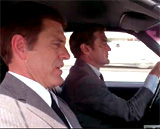
Mr. Allen in LA Traffic with His Associate (G.D. Spradlin)
|
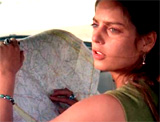
Daria - Enroute in a Car to Phoenix, AZ
|
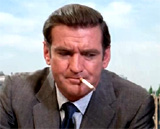
Real-Estate Developer Mr. Allen (Rod Taylor)
|
- meanwhile, Daria's secretary temp-work with
boss Mr. Allen had been extended (off-screen), and she was on the
road; she was traveling enroute to Phoenix in a borrowed, 1952 gray,
2-door Buick sedan to meet up at a "conference" with
Allen (who had plans to fly there) regarding the resort's development
[Note: It was significant that her destination was "Phoenix" -
the legendary bird that rose reborn from ashes and her trajectory
in the film.]
- Allen was unable to locate Daria
and was unaware of her whereabouts; he listened to a radio business
report that predicted massive economic growth for Southern California
in the next 10 years
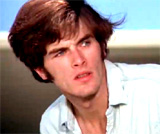
|
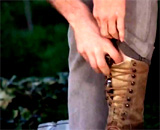
|
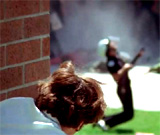
|
|
Mark Witnessing a Cop Killing - And Then Falsely Accused of the Crime
|
- the student protests, riots and strikes turned bloody
and violent, with tear-gas in the air and gunfire, as a group of
armed black militants attempted to take over a building on the
university campus; a tear-gas canister thrown inside forced the
group to evacuate; outside and perched at the corner of a building,
Mark observed as one black protestor ran out (misidentified as
having a gun) and was blasted with a shot gun; as he was about
to reach for his gun in his boot (and shoot the gun-wielding
cop?), the offending cop was targeted and fatally shot and killed
by someone else directly in front of him; he ran off from the scene
- to escape, Mark fled by city bus to the LA suburb
of Hawthorne, CA where he phoned his roommate Morty, who told him his
picture had been captured by the TV media; he asked a store-deli
manager for a free sub-sandwich but was denied; he wandered over
to the nearby Hawthorne Municipal Airport, and boarded a
small, pink-colored, single-engine 1967 Cessna 210 airplane (known
as the Lilly 7); as he taxied off to hijack the plane, he told
a flight mechanic (George Dunn) that he was just taking
a "scenic flight" - he was warned
by the tower that he was on the wrong runway before he took off
and headed eastward toward Phoenix, and viewed the city landscape
and many freeways below him (to the tune of the Grateful Dead's
instrumental "Dark Star")
- in the Rumpus Room, a desert ghost-town's diner
and pool room, Daria briefly phoned her boss 'collect' about arriving
late to Phoenix, due to a detour to either Glenville
or Ballyville - a "fantastic place for meditation" for her
to "think about things"; the bar-tender (Paul Fix) told her
that she was already in Barkstead where she wanted to be, and that
the meditation expert she was looking for was named James "Jimmy" Patterson
- a "do-gooder from Los Angeles"
- Patterson had brought a group of troubled ("emotionally
sick"), unwanted elementary school-aged, semi-feral children
to the area, who were causing trouble for the bar owner; one of
the kids was found plucking strings on a demolished piano; a group
of about a dozen of the kids surrounded Daria outdoors on a large
wooden platform, as one teasingly taunted and asked her: "Can
we have a piece of ass?" - to which she responded: "Are
you sure you'd know what to do with it?"; they began to grab
at her, causing her to run off to her car; during much of Daria's
time at the roadhouse, the jukebox played Patti Page's "Tennessee Waltz"
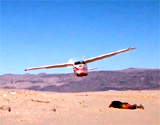
Buzzing Her With the Plane As She Laid in the Desert Sand
|
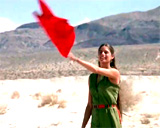
Daria Signaling With The Red T-Shirt Nightgown Tossed Down to Her
|
- afterwards, she was noticed by Mark in his small
airplane, partly terrorizing her by buzzing her and harrassing
her with the plane (reminiscent of North
by Northwest (1959)); after he tossed a T-shirt nightgown
down to her, she became more curious and amused, and signaled him;
after driving along, and listening to The Youngbloods' "Sugar Babe"
on the radio, she watched as he landed the plane near her; her first
words to him were about the red "nightie"
that she said was not good for her - it was the "wrong sex"; nearby
was the desert shack of an eccentric, grizzly old man
- Daria questioned Mark about the theft of the plane
early in the day in LA: "The radio said somebody
stole a plane in L.A. this morning. Did you really steal that thing?
How come?"; he answered that he wanted to feel free: "I
needed to get off the ground"
- now distracted from her original destination, she
drove off with Mark into the desolate desert and into an area
of open landscape known as "no-man's land" of Death Valley; in a parking lot overlook
at Zabriskie Point - the lowest point in the United States, Daria
read the park's informational sign outloud: "This is an area
of ancient lake beds deposited five to ten million years ago. These
beds have been tilted and pushed upward by Earth forces, and eroded
by wind and water. They contain borates and gypsum"; she asked
herself: "Borates and gypsum?"; Mark joked with her: "Two old prospectors that
lost their way"; they sat on the edge of a rock wall and marveled
at the plants and arid landscape - a period of self-exploration
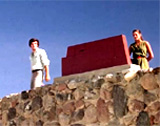
|
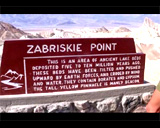
|
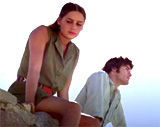
|
|
At Zabriskie Point - The Lowest Point in the United States
|
- Daria learned that up until recently, he had been
driving a fork-lift for a warehouse; earlier, he had dropped out
of college due to "extra-curricular activities" - such as "stealing
hard-covered books instead of paperbacks, making phone calls on
the Chancellor's stolen credit card number, whistling in class,
and bringing in illegal things on the campus like a dog, a bike,
and a woman...we did it in the road... yeah, they finally kicked
me out after I broke into the Dean's office and reprogrammed a
computer"; she was intrigued and asked about the rest of his "criminal
record"; he further elaborated: "Once I changed my color but it
didn't work, so, I changed back"
- she mentioned that back in the "real world" and
related to LA's recent deadly student strike and protests, she
had heard that "a cop did get killed and some bushes were trampled...I
think they said the guy who killed the cop was white"; Mark quipped:
"White man takin' up arms for the blacks, huh? Just like old John Brown"
- they ran down the very steep slope to the dry river-bed
where Daria smoked marijuana, but he abstained; she mentioned something
about the protest group he had attended: "What do you mean, 'Reality
trip.' Oh yeah, they can't imagine things. Were you in with that
group? Why didn't you get out?"; he explained that he had left
the group because he was bored, but added "When it gets down to
it, you have to choose one side or the other"; she answered: "There's
a thousand sides -- not just heroes and villains"; he proposed
that the two of them take on the establishment; she asked: "Don't
you feel at home here?", but he disagreed: "It's dead"
- she proposed a game of killing small creatures in
the desert, realizing that he was nihilistic, and at the end of
the game, "the winner will get to kill the loser," but he refused
to "play any games at all"
- as the uninhibited couple walked on, now holding
hands, she decided to pretend that their thoughts were like plants,
and asked: "What do you see? Neat rows? Like a garden? Or wild
things? Like ferns and weeds and vines?"; he replied: "I see, sort
of, a jungle"; she thought about how nice it would be if
the thoughts planted in their heads didn't include "bad memories...wonderful
things, like a happy childhood, real groovy parents, only good
things"; he thought her idea was "far out" - and proposed: "Make
out and forget how terrible it really was"; after frolicking around
in the dust and shouting to produce echos, she offered another
unusual thought: "Anyway ought to be one word. The name of some
place or a river. The So-Anyway River"; shortly later, he asked
her to join him on his life's journey: "Would you like to go with
me...wherever I'm going?"
- they began to kiss, undress each other, and make
love on the desert sand dunes, to the tune of the Grateful Dead's
Jerry Garcia playing "Love Scene" on the
soundtrack; it was the film's most extraordinary sequence - an
hallucinatory, symbolic, dust-swirling orgy or love-making sequence;
several dozen ash-covered copulating and kissing couples (and trios)
(at least 100 phantom individuals, credited as the improv Open
Theatre group of Joe Chaikin) magically appeared, creating a massive
'love-in'; the views of the contorting bodies began to blend into
the landscape, uniting and becoming one
|
The Zabriskie Point Love-Making Sequence
|
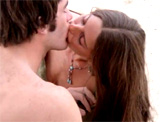
|
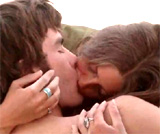
|
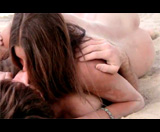
|

|
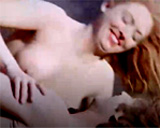
|

|
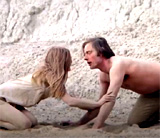
|

|
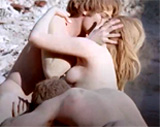
|
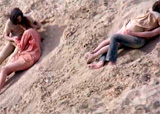
|
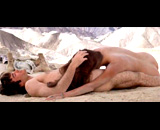
|
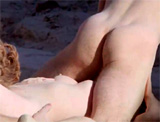
|
- after the free-love experience and the dust cleared,
Mark remarked: "I always knew it'd be like this"; Daria asked: "Us?"
but he replied instead: "The desert"
- the two climbed back up to the road level where
two red portable toilets were located; while Daria was being
questioned by a lone, suspicious highway patrolman (William Watson),
she blocked Mark's line of sight (he was hiding behind one of the
toilets) and prevented him from firing at the officer with his
gun, and the officer left unharmed; Daria called Mark "really crazy"
and then watched as he unloaded the bullets into the dirt; she
suddenly became very wary of Mark, suspecting him of being the
cop-killer at the student strike, but Mark dissuaded her: "No,
I wanted to, but somebody else was there...I never got off a shot";
she believed him, but he was resigned to being blamed
- now knowing that he was wanted by the police, Mark
was anxious to return to Los Angeles by flying back and surrendering
the hijacked plane - now decorated with additional flowers, slogans,
and peace/love symbols: (NO WORDS, SUCK BUCKS, FREECOME,
SHE HE IT - or a long drawn-out "SHEE-IT") with assistance
from the eccentric old man; Mark described the plane's new design: "They
might not even think it's a plane. Strange, prehistoric bird spotted
over Mojave Desert with its genitals out"; although Daria
suggested ditching the plane and riding along with her to Phoenix,
the brazen young Mark was unfraid to return: "I want to take
the risks"; after watching him take-off, Daria proceeded along
on her drive to Phoenix, listening to her radio (the Rolling Stones' "You
Got the Silver", and Roscoe Holcomb's country song "I
Wish I Were a Single Girl Again")
- at the Hawthorne airport after he landed - on his
death-defying return trip, Mark's plane was greeted and surrounded
by awaiting police patrol cars and KRLA media reporters; as he
was chased down the runway (and was believed to be evading capture),
he turned the plane onto the grass where he was brutally shot dead
in the cockpit by indiscriminating gunfire (Mark was briefly glimpsed
slumped over onto the controls)
- Daria was continuing on with her drive to Phoenix,
when she heard a radio report of an unidentified officer firing
shots into the cockpit of the returning stolen plane and "killing
the youth immediately"; she pulled over and stood outside
her car, to absorb the news amidst large saguaro cactus; after
a moment's pause to possibly reconsider her trip, she decided to
continue onward, and arrived at attorney Mr. Allen's luxurious,
ultra-modern, maze-like desert dwelling built amongst huge boulders;
her boss was scheduled to hold business meetings there about his
real-estate plans
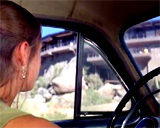
|
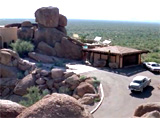
|
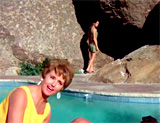
|
|
Daria Driving Up to the Opulent House
and Entering by the Pool
|
- soon after, however, she became distressed
by the wealth, greed and empty opulence of the place and Mr. Allen's
affluent cohorts sunning themselves at a swimming pool; she stood
under the home's indoor waterfall, letting drops of water drench
her - symbolic of her grieving for Mark's death; she watched as
one of the house-keeper/maids - a Native-American woman, served
drinks to Lee Allen's associates as they discussed their real-estate
dealings (seen non-verbally from a distance); it appeared that
the financial gains for Sunny Dunes resort in the desert were highly-speculative
and an overreach based upon the community's interests - their
plans would undoubtedly despoil the primitive beauty of the desert
- Mr. Allen found Daria wandering around in the house,
and told her that he had set aside an overnight guest room for
her downstairs; after her initial disgusted and appalled reaction
to everything, and a knowing glance at the Native-American woman,
she decided she didn't want to remain there, and ran to her car
in the parking area
- as she drove away from the home, she stopped the
car, softly caressed the red shirt Mark had given her, and turned
around; in the film's explosion-filled finale accompanied by a
Pink Floyd soundtrack, she appeared to have an angry, anarchic
wish-fulfillment hallucination, fantasy or dream - symbolizing
the destruction of capitalistic excess; it was similar to Mark's
revolutionary impulses, and to the previous orgasmic sequence in
the desert
- the structure was blown up in slow-motion
(seen repeatedly exploding from almost a dozen different angles,
using 17 camera set-ups); in addition, various materialistic consumer
items were seen being destroyed in slow-motion and in extreme close-up
(pool furniture, racks of designer clothes, a refrigerator with a
cascading and disintegrating loaf of packaged WONDER bread, flying
frozen chickens, a box of Special K, a banana, a TV set, and shelves
of books); she observed or imagined the apocalyptic end of the
materialistic and capitalistic America

|
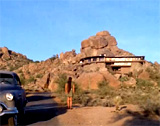
|
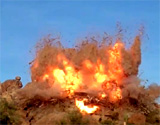
|
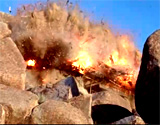
|
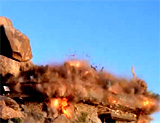
|
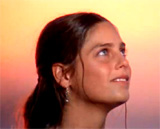
|
|
The Devastating House Explosion -
Daria Looking Up at House For One Last Time
|
- the film ended with Daria beaming as she looked
up at the house (had it really been destroyed, or was it only
in her mind?); the film ended as she drove away into the
desert and an uncertain future (to the tune of Roy Orbison's "So
Young"), as the camera panned over to view the golden rays of the sun as it set
|
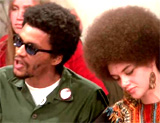
Discussion With Black Revolutionaries in a Campus Classroom:
("White radicalism is a mixture of bulls--t and jive!")
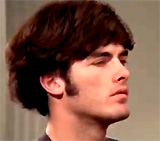
Dropout/Drifter Mark (Mark Frechette) - Dying of "Boredom" During
the Planning Meeting of Student Rebels
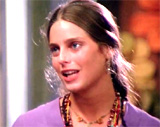
Hippyish Daria (Daria Halprin) - Temp Office Worker-Secretary
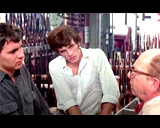
(l to r): Bill, Mark, and LA Gun Shop Clerk
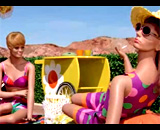
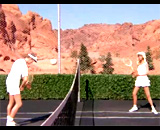
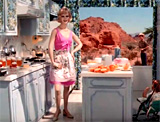
TV Commercial for Sunny Dunes Estates Resort Development in the Arizona Desert
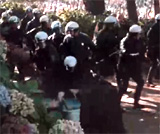
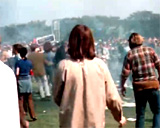

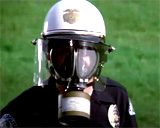
Student Protests and Massive Police Presence
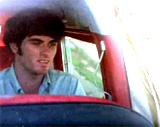
Mark in Hijacked Cessna Airplane Heading Toward Phoenix
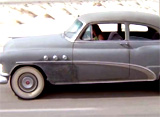
Daria in Buick Also Headed Eastward
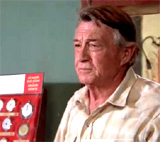
Bar/Cafe Owner (Paul Fix)
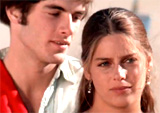
Daria's Question to Mark About the Stolen Plane in LA: "Did you really steal
that thing?"
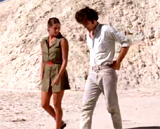
Together At the River-Bed Below the Overlook at Zabriskie Point in Death Valley
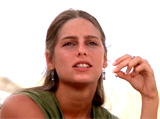
Daria Smoking a Joint
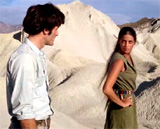
Expressing Two Opposing Opinions About the Desert: Beautiful and Dead
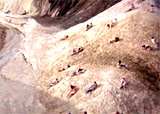
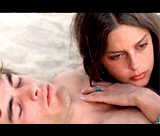
The End Shot of the "Love-In" in the Desert
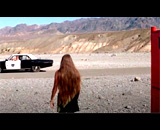
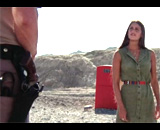
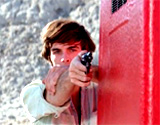
Daria Questioned by a Highway Patrolman - Shielding Him From Mark Tempted to
Shoot Him
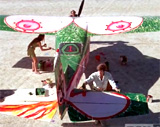
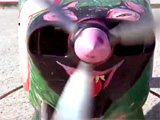
The Repainted Hijacked Airplane With a Pig's Face
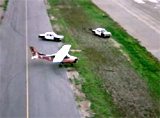
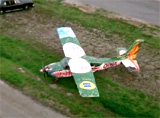
The Landed Plane Surrounded by Police Cars And Fired at Indiscriminately
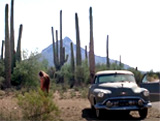
Daria Sorrowful About Mark's Death
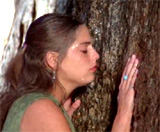
Grieving For Mark's Demise Under Waterfall - Also a Cleansing Rebirth
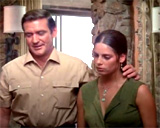
Daria Greeted by Mr. Lee Allen
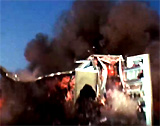

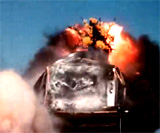
Consumer Items Blown Up - a Refrigerator, a Rack of Clothes, a Television
|


































